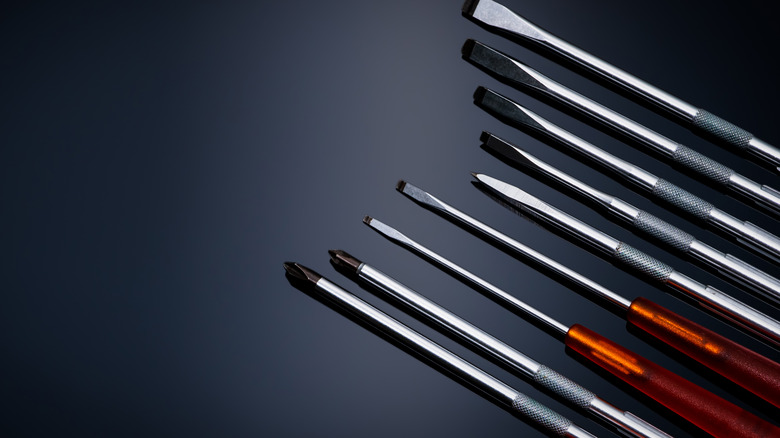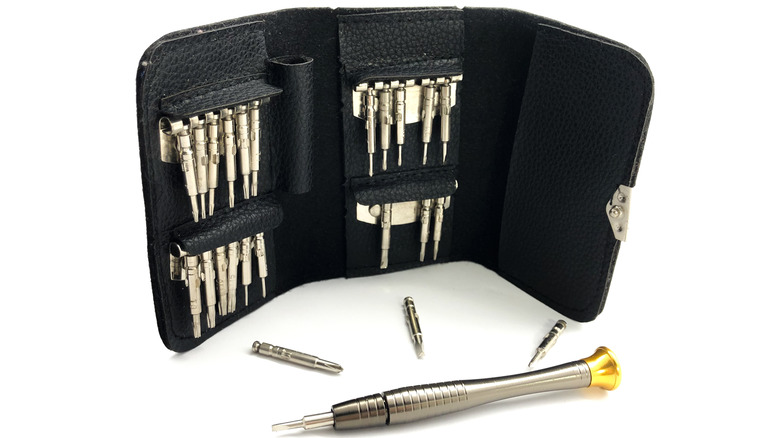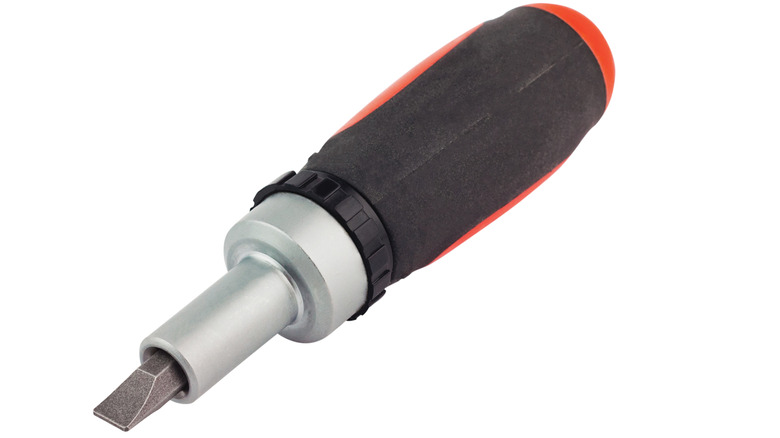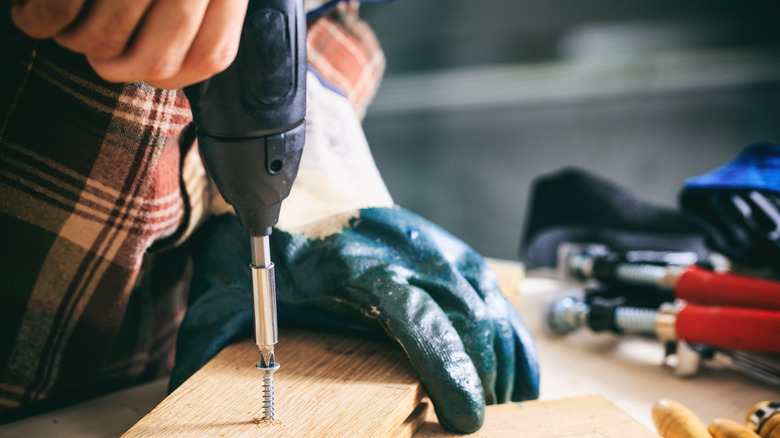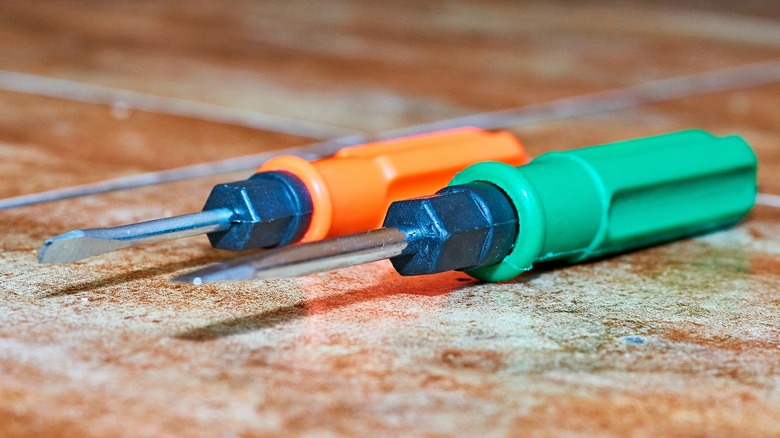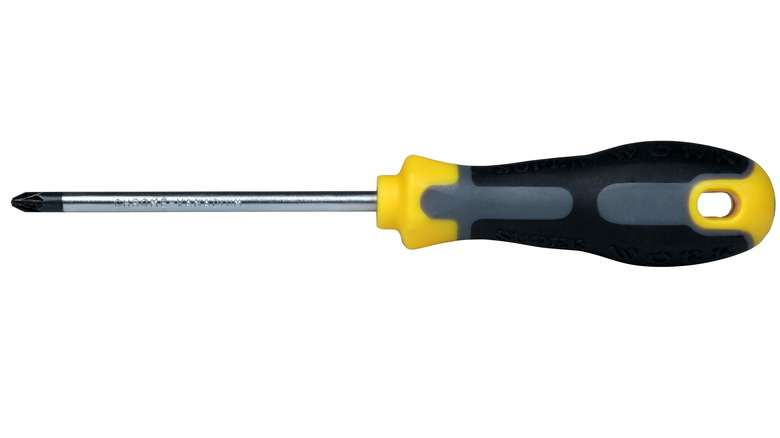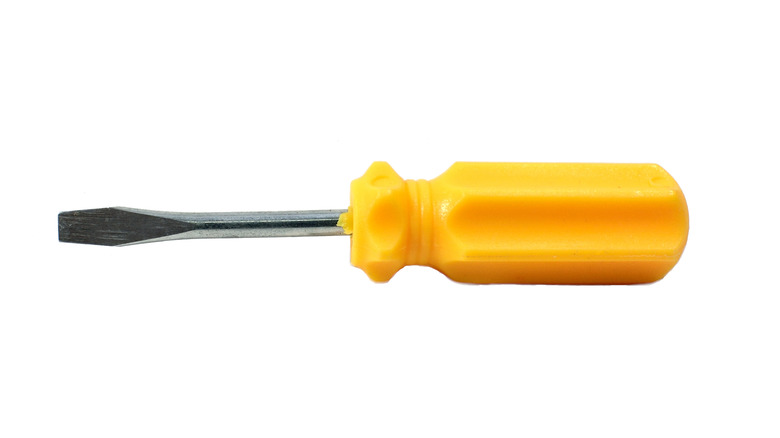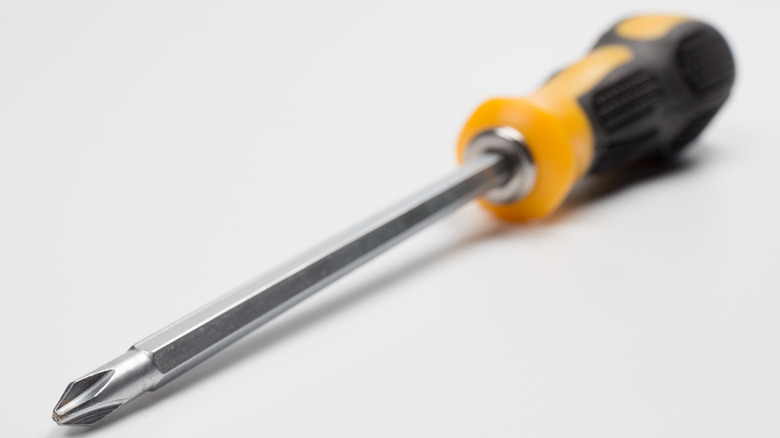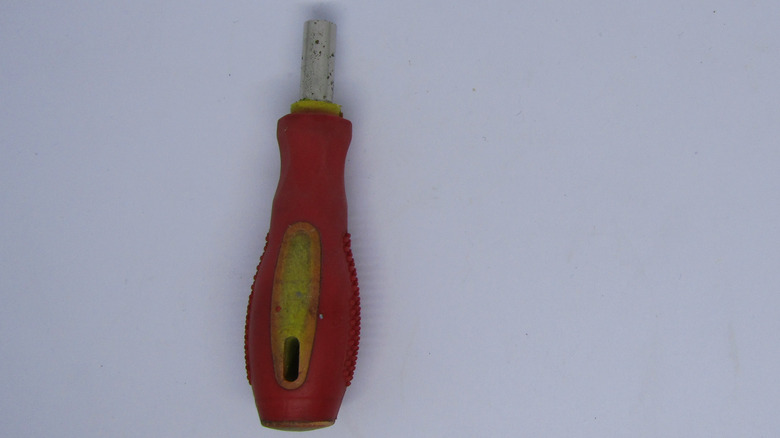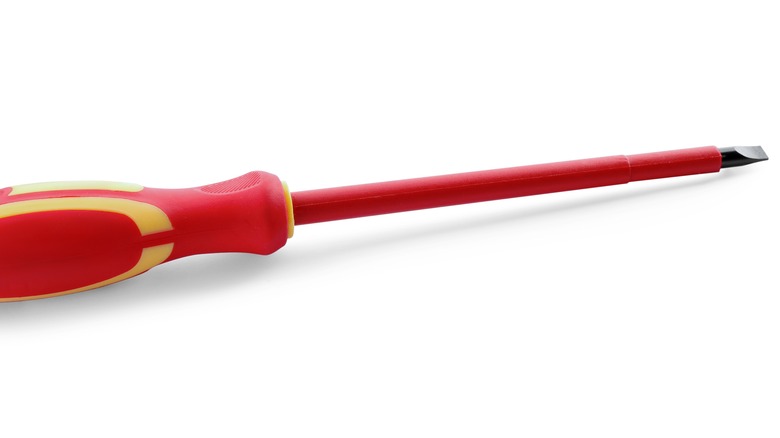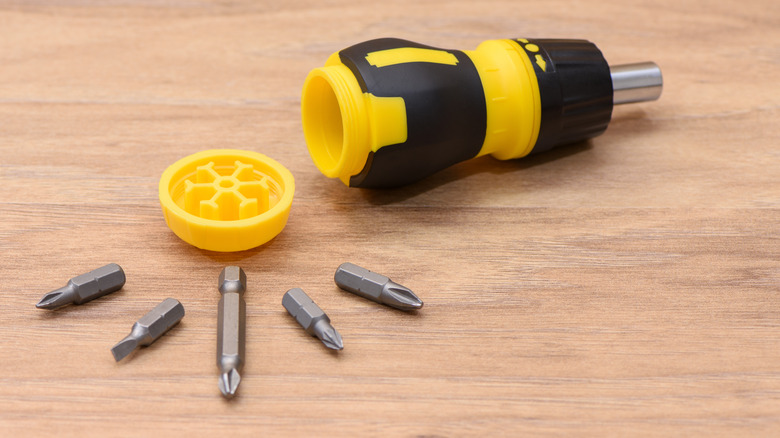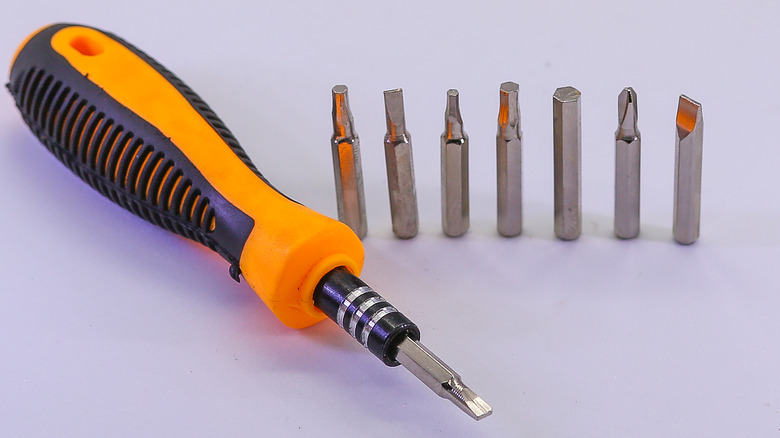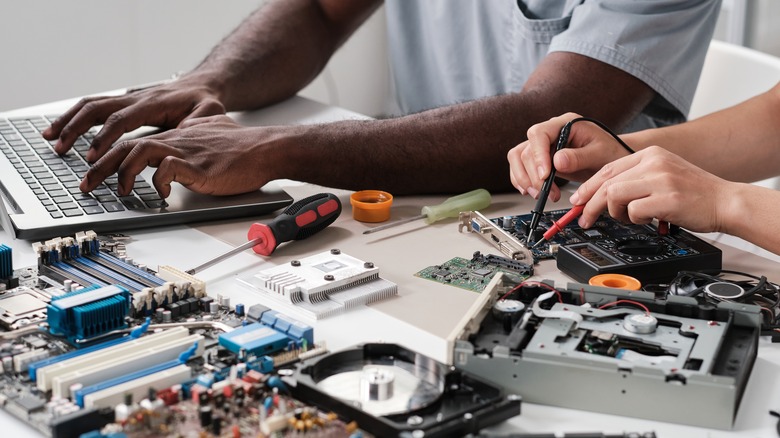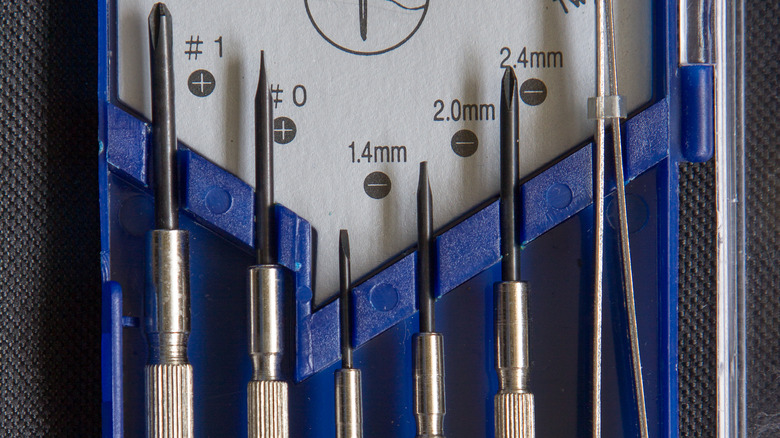15 Types Of Screwdrivers That Are Good For Any DIY Project
A screwdriver may be just a simple tool, according to RS Components. However, when it comes to adjusting screws or installing and assembling, it's one of the most versatile. While you have various types of screwdrivers, both manual and electric, the most common ones include the standard varieties like the flathead and the Phillips. Likewise, you'll mostly find these items in sets that include screwdrivers with different tips and different sizes of shafts. Some also have changeable tips that go on one handle and shaft.
As the screwdriver tends to be one of the most essential tools any tool kit might have, its many uses range from opening mobile phones, laptops, electrical equipment, to carpentry, metalwork, or even tasks in flammable environments. Some types are mostly categorized according to the shape of the indentation on top of the screw's head. However, other types are classified according to their specific purpose. To that end, here are 15 types of screwdrivers that are good for any DIY project.
1. Magnetic screwdrivers
Some do-it-yourselfers prefer magnetic screwdrivers due to the connection between the tip of the screw and the screwdriver, per Bob Vila. This magnetic force, although small, helps the screwdriver to stay intact when loosening or tightening screws. So, your tool will have less chance of slipping.
When you're looking for an ideal set of magnetic screwdrivers, make sure you pay attention to the shaft length, the handle, possible ratcheting mechanism, screwdriver bits, and of course, the weight and balance. After all, you want to speed up your home projects or repairs, not slow them down.
2. Ratcheting screwdrivers
Efficiency and versatility make the ratcheting screwdriver useful for all of your woodworking projects like crafting smaller pieces or installing shelves. When you need a tool that gets into areas that are difficult to reach, according to Home Questions Answered, this type of screwdriver works best.
Another benefit is its ability to tighten or loosen a screw with a more continuous motion due to the design of the handle. Thus, you don't have to remove the bit from the screw's head or adjust your pressure on the screw, which saves you time in the long run.
3. Cordless electric screwdrivers
For almost any project around your home, a cordless screwdriver provides versatility and speed. Not to be mistaken for the cordless drill, its main purpose is to tighten screws that are already installed in their proper places, as noted in the Cordless Drill Guide.
While this might sound limiting, you can still use a cordless screwdriver to fix almost anything that requires an adjustment. This means that when used with care, there's no chance for camming or slipping. The one factor you'll need to remember, however, is that the battery life is limited. Thus, the scope of your projects only reach as far as simple fixes as opposed to any new construction or a lengthy installation.
4. Corded electric screwdrivers
Both cordless and corded screwdrivers come in a variety of sizes and shapes in regard to their handles. Plus, their driver heads are shaped with a slight angle that reaches into corners where you can tighten hinges, according to Expert Home Report. Also, they both have the same precision that allows you better control over the tool to keep from breaking the material that you're working with.
The corded screwdriver, however, does possess more power and is ready to use wherever you have an outlet since it doesn't rely on a rechargeable battery. This also makes it slightly more lightweight without the battery attached. The only drawback is having to be more cautious with outdoor projects.
5. Bolster screwdrivers
The bolster screwdriver works best on more challenging projects in which you'll need a manual screwdriver with more torque, per ToolGuyd. With the bolster feature, you have the option of using a wrench to gain extra power. This proves to be useful if you're trying to tighten or loosen screws that don't want to budge, but a power tool presents too much risk of stripping or breaking the screw. Depending on your preference, you can find screwdrivers with the hexagonal bolster located on top of the handle or just underneath it right where the shaft begins.
6. Pozidriv screwdrivers
The Pozidriv head resembles that of a Phillips, but if you look closely, you'll see the difference between these two types of screwdrivers. According to the Albany County Fasteners blog, you'll find four parallel, straight lines in each corner of the "cross" on the head. Other traits that differ between the Pozidriv type and the Phillips include a lower risk of slipping and the enhanced torque that prevents cam-out. These qualities also make this an ideal screwdriver for woodworking projects, assembling structures or furniture, and attaching metal fixtures or plates to wood surfaces, as mentioned on the RS Components site.
7. Flathead screwdrivers
This type of screwdriver tends to get used for other purposes aside from the original one, as mentioned in Live About. You might remember using a flathead screwdriver to pry open a can of paint or finish, or perhaps you may have used a flathead to scrape a surface. Nevertheless, its intended purpose — loosening or tightening screws — is the main reason why you'll always need to have this handy tool available, whether you're installing plates onto outlets or light switches (with an insulated shaft and tip) or putting together a pre-fabricated item.
8. Phillips screwdrivers
The other type of screwdriver that's a common mainstay in any toolbox is the Phillips. Because of its pointed head that fits one specific type of screw, you won't find many other uses for the Phillips. Nonetheless, according to How Stuff Works, the screws with Phillips head are often preferred by carpenters because of their snug fit. For the most part, you'll only use the manual version of the Phillips to adjust screws, whereas the electric screwdriver or drill with a Phillips head would be more efficient for bigger jobs like installing sheetrock.
9. Allen wrench
You might have opened the package to a prefabricated piece of furniture or shelving from Ikea and found an Allen wrench inside. Or possibly, you may have heard of its other monikers such as an Allen key or a hex key. Regardless of name, this useful tool is a must-have in your workshop if you repair or assemble your own tool, suggests the Moglix blog. Additionally, this type of screwdriver comes in handy if you have a project that involves fastening bolts with a hexagonal indentation on the head.
10. Torque screwdrivers
According to How Stuff Works, the manual version of this type of screwdriver closely resembles any other variety. However, if you look closely, your handle is broader and the shaft is not as long compared to other types. Plus, your torque screwdriver will come with an array of bits to suit almost any project. When you need both precision and power to work with harder and thicker materials — like the redwood for your new pool deck — the torque screwdriver is the way to go.
11. Insulated screwdriver
If you prefer to complete your own electrical projects, or you're able to repair your own appliances, you'll need a set of insulated screwdrivers. According to The Spruce, the handle is made from a material that won't conduct electricity while the shaft is sealed completely with a rubber coating. In fact, insulated screwdrivers come with a safety rating that pertains to how much contact they'll have with the wiring. Therefore, only insulated screwdrivers can be used on junction boxes, the instillation of switches and outlets, or any other electrical work.
12. Multi-bit manual screwdrivers
A few of the previously mentioned tools might fall into this category, but you'll find the manual variety of multi-bit screwdrivers to be extremely useful for saving space in your tool box. One handle with a shaft and a compact container of bits of various shapes and sizes gives you many options for any small project or repair, as noted by Wire Cutter. Some come with a cap that rotates while you hold on to the shaft which is ideal for smaller size heads. Others come with a standard handle that's similar to a regular screwdriver.
13. Torx screwdrivers
If your project involves fixing your own bikes, ATVs, or small electronic appliances, this type of screwdriver provides non-slip precision and additional torque to tackle the task at hand, says Insight Security. Although you might mix this type up with the torque screwdriver, you'll see some major differences in the shaft and head. For starters, you have a choice between L-shaped handles or the standard type. However, the head, which is shaped like a star, is designed for a specific type of screw whose indentations have the same exact shape. So, there's no risk of stripping or camming.
14. Computer screwdrivers
The types of screwdrivers that you would use to repair a desktop, laptop, or gaming device are specially designed for that purpose, according to Garage Tool Advisor. Also, if you're comfortable with making minor repairs to other electronic devices, then your best option is a set of computer screwdrivers which are also known as precision screwdrivers. Plus, you're likely to find a variety of heads to fit almost any type of screw such as a Torx (star), Phillips, and a tri-point.
15. Jeweler's screwdrivers
The jeweler's screwdriver is another precision screwdriver that's smaller than most. You might also notice a much thinner shaft, and most blades resemble a tiny version of a flathead. In fact, the sizes range from 0.025 of an inch to a tenth of an inch, as noted in Home Guides. As mentioned in Home Questions Answered, these types of screwdrivers prove to be most useful when repairing smaller pieces like eyeglasses and pocket watches. A simple adjusting of a screw on a small jewelry box would require a jeweler's screwdriver.
